
Youran Wang ’22 — I was very fortunate to be able to assist Prof. Schmitzer-Torbert with his research this summer. Of course, it would not have been possible without the help of career service and the psychology department at Wabash College. Thus, I would like to express my gratitude to Prof. Schmitzer-Torbert, Wabash psychology department, Roland Morin, and Wabash career service for making my summer research internship possible.
For my summer internship, we recruited participants from Amazon Mechanical Turk (mTurk) in a psychological study of how decision-making systems are related to nicotine use (potentially nicotine cessation). For the first two weeks, we primarily focused on reading literature related to decision-making and learning how to code using the programming language R, which we will use later on for our analyses. After that, we started recruiting participants on campus and used the data for analyses. Every day, we would meet in the mornings and discuss the work that we did the day before. Then we would determine what we needed to do on that day. And the rest was independent work. By the end of the internship, we found that consistent with the literature and our previous research, cigarette users have a higher discounting rate. Discounting rate is also negatively related to self-reported intentions to quit nicotine-use, and positively related to self-reported nicotine dependence. We also found that during a virtual-navigation foraging task where a participant needs to decide whether to wait for a certain amount of time for a certain reward, participants took longer time and showed higher deliberation (vicarious trial-and-error) when they made bad choices; however, such relationship is reduced in cigarette users. We also found, unexpectedly, that participants who indicated higher nicotine dependence showed reduced deliberation with bad choices. What’s more, cigarette users engaged in more deliberation processes when facing difficult choices. The last factor we assessed is navigation strategy. The result suggested that navigation strategy might moderate lifetime-long nicotine use and discounting rate. Although we found no relationship between nicotine use and navigation strategy, what we found could suggest that nicotine use is related to disruptions in several decision-making systems, which are different across different ways of nicotine uses (cigarettes, e-cigarettes, vaping, etc.).
There were obstacles and challenges along the way. I am grateful that my internship supervisor, also my mentor, Prof. Schmitzer-Torbert helped me overcome those hardships, personally, academically, and professionally. As a student who is planning to attend graduate school, this internship showed me what I should expect in graduate schools. And more importantly, it made me realize and, on some level, helped me confirm what I want to do in the future, just as one of my dearest friends once told me, “You learn about what you love to do by doing things.”